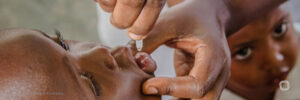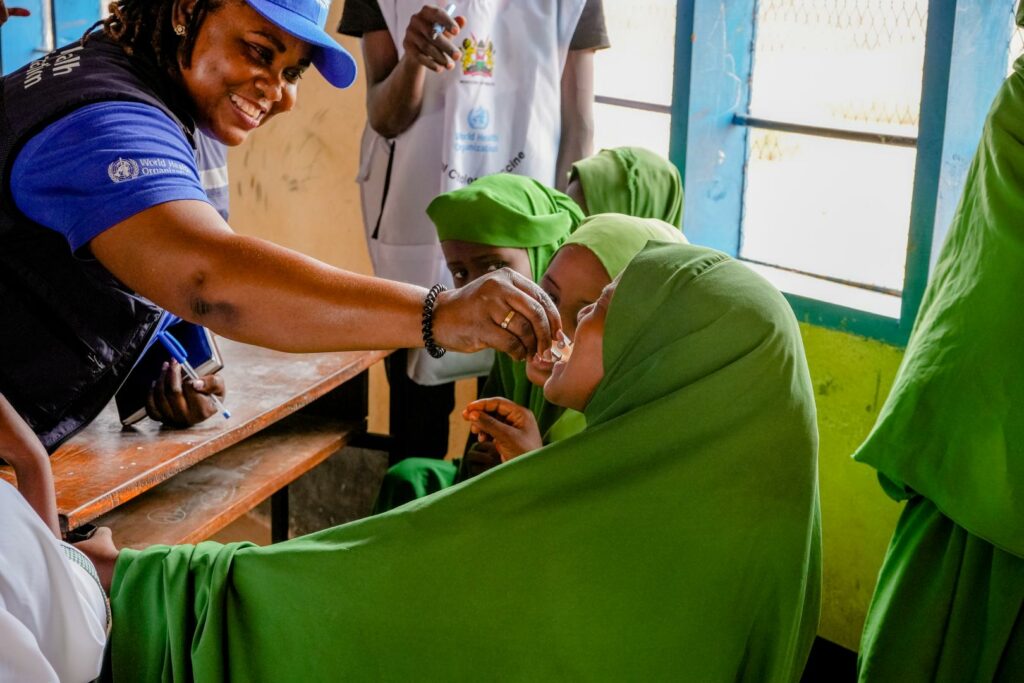Africa has also made tremendous progress in the fight against polio, recording a 93% decline in circulating variant poliovirus type 1 cases from 2023 to 2024 and a 65% decrease in variant poliovirus type 1 cases in just the past year
An increase in vaccine coverage in Africa is helping protect millions of people from life-threatening diseases such as measles, polio and cervical cancer.
In 2023, vaccination saved at least 1.8 million lives in the African region, nearly half the global figure of 4.2 million. These advancements have been possible thanks to government efforts and the support from partners including Gavi, the Vaccine Alliance (Gavi), UNICEF, World Health Organization (WHO) and others.
More than 5 million “zero-dose” children – children who have not received a single dose of an essential routine vaccine – in the African region have been vaccinated since 2024 through the “Big Catch-Up” initiative launched in 2023 in 24 priority countries to protect communities from vaccine-preventable outbreaks, save children’s lives and strengthen national health systems.
Despite a growing birth cohort between 2022 and 2023, the region recorded a two-percentage-point increase in the diphtheria-tetanus-pertussis (DTP3) immunization coverage among 1-year-olds, from 72% to 74%, an important sign of recovery in routine immunization services post-COVID-19. This progress means that amid a rising number of births, governments are vaccinating more children each year than ever before. Notable gains were seen in Cameroon, Chad, Côte d’Ivoire, Ethiopia, Madagascar, Malawi, Mozambique and Uganda.
In addition, more girls than ever are being protected against cervical cancer, a disease that kills a woman every two minutes worldwide. Human papillomavirus (HPV) vaccination coverage (one dose) has increased to 40% in 2023 up from 28% the year before – making Africa the region with the second highest coverage rate globally, empowering millions of girls to fulfil their potential.
Africa has also made tremendous progress in the fight against polio, recording a 93% decline in circulating variant poliovirus type 1 cases from 2023 to 2024 and a 65% decrease in variant poliovirus type 1 cases in just the past year.
This year, World Immunization Week/African Vaccination Week, which is being marked under the theme Immunization For All is Humanly Possible, aims to promote the life-saving power of immunization to protect people of all ages against vaccine-preventable diseases.
“We have made great progress in expanding vaccination and saving lives, thanks to the dedication of governments and partners. But we still have more ground to cover. We must sustain and expand these life-saving efforts to build a stronger, healthier future for all,” said Dr Chikwe Ihekweazu, Acting WHO Regional Director for Africa.
Despite the progress, challenges persist in reaching children in the region. One in four children remain under-vaccinated (missing out on key routine vaccines) and one out of five children are unvaccinated, with many countries facing recurring outbreaks, particularly of measles – a highly contagious and potentially fatal disease. These gaps, which leave the region vulnerable, can be attributed to persistent barriers including limited access to healthcare in remote areas often due to conflict and instability, logistical and cold chain constraints, vaccine hesitancy driven by misinformation, and insufficient funding for immunization programs. These challenges are further compounded by disruptions caused by public health emergencies.
“The progress seen across African countries—bolstered by an unprecedented record of co-financing toward vaccine programmes in 2024 by African governments—demonstrates the tangible impact of sustained commitment,” said Thabani Maphosa, Chief Country Delivery Officer at Gavi, the Vaccine Alliance. “However, this momentum must not stall. Conflict, population growth, displacement, and natural disasters are creating ideal conditions for outbreaks to emerge and spread. Investing in immunization and securing sufficient funding for Gavi to carry out its mission over the next five years is essential to protect our collective future.”

Building on the gains in Africa, Gavi has launched an ambitious five year strategy, ‘Gavi 6.0’ which is anchored on three key pillars: protecting the world against pandemics and disease outbreaks; protecting people by vaccinating more children against more diseases than ever before – including reaching 50 million children with the malaria vaccine by 2030; and protecting communities by reducing the number of zero-dose children.
A successful replenishment for Gavi will enable the Vaccine Alliance –a coalition of partners that includes 39 African governments – to implement this impactful 6.0 strategy and will enable countries to protect and advance the progress that has been made to date. Full engagement across the Alliance to obtain the necessary funding over the next few months will be critical. 2025 also marks the mid-point of the Immunization Agenda 2030, which aims to prevent diseases, promote equity and build strong immunization programmes.
To achieve these goals, African governments and partners are encouraged to accelerate progress towards reducing zero-dose children, increase routine immunisation coverage, accelerate malaria vaccine introductions and expand access to HPV vaccines. Maintaining the progress achieved in immunization over the years will also require regional commitment to implement key strategies.
These include increasing investment in health systems and infrastructure for effective vaccine delivery; enhancing surveillance systems to respond swiftly to outbreaks; addressing vaccine hesitancy and misinformation; bolstering domestic funding for immunization programmes; increasing the use of innovation and technology for better vaccine delivery; and investing in research and development for vaccine development.
In 2024, Gavi and partners launched the African Vaccine Manufacturing Accelerator (AVMA), a financing mechanism established to make up to US$ 1.2 billion available over ten years to accelerate the expansion of commercially viable vaccine manufacturing in Africa. Two new collaborations under this initiative were signed earlier this year, in a positive step towards enhanced regional health security.







OTHER ARTICLES
Editorial — Prevent, inform, and act for women’s health in Africa
Kenya : Government Prioritises Maternal Health and Strengthens Support for Community Health Promoters
Strengthening pandemic prevention, preparedness, and response capacities in Senegal using the “One Health” approach